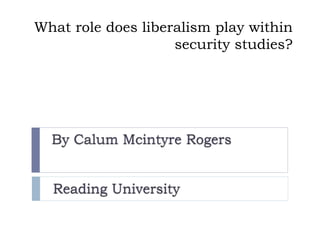
What role does liberalism play within security studies
- 1. What role does liberalism play within security studies?
- 2. Defining terms: ‘Liberalism’ (in international relations); “[The] theory [advocating] Government between states and peoples worldwide. .. Liberals seek to project values of order, liberty, justice and toleration into international relations.” (Baylis/Smith/Owens). Security studies; theories and ideas aimed towards understanding the concept of security in international relations, and envisioning theories for increased security in the international context. ‘Security’ meaning the “[presence] of threats to acquired values, and in a subjective sense, the absence of fear that such values will be attacked.”
- 3. The main standpoints of liberal internationalists: “A rising tide lifts all boats” ; an international atmosphere of all- encompassing progress is in the interests of all states, rather than alienating one state from others through increased power “Democratic peace theory”; Immanuel Kant hypothesised that democratic republics should eventually reach a perpetual peace with one another. Emphasis on free international trade; the theory of this concept is that once companies from differing states begin to trade, the ties between states become closer, decreasing the likelihood of war and economic aggression. International constitutionalism; abolishing the “state of nature” (Hobbes) in international politics; establishment of international lines of communication, treaties and etc to make international relations a (theoretically) logical, constitutional process.
- 4. Liberals and Global Security in Action The first serious attempt to institute a constitutional international system was done in the aftermath of the first world war, in the form of the League of Nations. As should be expected from it having been forged in the aftermath of by far the bloodiest conflict in (at that point) Western history. The LON acted successfully in some areas, such as halting a Greek-Bulgarian conflict in 1925 amongst some other achievements. For better or for worse, the LON is the forebear of our present international constitutional arrangement (the UN). By furthering the liberalisation of international trade, liberalism in international politics has arguably created a pax financia, eloquently expressed in Thomas L Friedman’s ‘Golden Arches Theory of Conflict Prevention’, the theory that no to countries which are host to a Mcdonalds restaurant would go to war (later proved false). Despite this theory being obviously somewhat comedic, it does hold up to reason; when a country is inviting foreign investment, it stands more to lose should conflict arise, and as a consequence wars between liberal democracies are extremely scarce. States with tight grips over their economies have greater capacity to use their economies aggressively than liberal ones, eg China’s recent de facto embargo on rare metals to Japan (which is reliant on them for much of its economy).
- 5. Liberals and Global Security in Action (continued) Liberal internationalists have historically lobbied for ‘self determination’, whereby de jure countries should be themselves self-governing states, rather than be ruled through an empire of many peoples. The theory is that a self-determined democratic state will not aggressively seek expansion, as the populace recognise the state’s territory as their own and borders are clearly identifiable and will not support their governments in wars of expansion. The most recent example of self-determination in international relations is that of the new state of Kosovo; by (through the UN and EU) establishing the new state on the ‘cultural boundaries’ in ‘old Serbia’ a clearly identifiable region becomes an autonomous state. The theory is that the Kosovar people will not be subject to genocide in the future, now that they are ‘self determined’ in their own state, and that the likelihood of future conflict in the region is now lowered, due to mutual recognition of territory (presently a problem, as Kosovo is not recognised by Serbia or several other states) and the preservation of national borders and military forces.
- 6. Criticisms of Liberal Internationalism in Global Security Liberalism has been criticised in its handling of international security issues in several respects. Firstly, is the accusation that international security preservation by federalised international institutes is unworkable. This is not an unsubstantiated viewpoint. The 1934 Italian invasion of Abyssinia was essentially unpunished. The League of Nations’ sanctions did not extend to important commodities (specifically oil), and Italy ignored all opposition until it conquered all of Abyssinia (whatever sanctions against Italy there were had been halted upon cessation of the war). More recently, the UN opposition to the American-British invasion of Iraq was ignored and yet it proceeded with no consequences. The capacity of international institutions to prevent war, it seems, is limited to weaker states, and cannot prevent a determined effort by powerful states to prevent conflict.
- 7. Criticisms of Liberal Internationalism in Global Security Israel, amongst other states, can be interpreted as opposing international liberalism on the grounds that it sees it as detrimental to its security. Firstly, that (they interpret) the UN is biased against Israel and opposing actions they see vital to their security (eg, invasions of Lebanon and other military expeditions supposedly important to their security), and perhaps most pertinently their blockade of the Gaza strip. Though the UN opposes it on humanitarian grounds, Israel’s government is adamant that it is necessary. "Due to the UN's unvarnished belligerence toward it, in recent years a consensus has formed in Israel that there is nothing to be gained from cooperating with this openly and dangerously hostile body.“ – Caroline Glick, journalist.
- 8. In Summary; Liberalism, for better or for worse, has profoundly affected the way in which states act in matters of security in its establishment of international institutes (effectiveness/lack of effectiveness is debatable). The growth of international trade (globalisation) has certainly led to the lack of inter-state conflict since WWII. Self-determinative state building theoretically increases international security by decreasing war.
Hinweis der Redaktion
- Eg, rather than spending money on tank brigades in order to hold power, focussing on helping and cooperating with your neighbours will create a more stable set of states with which to conduct relations.
